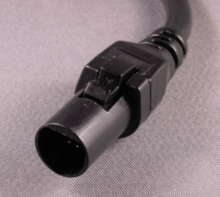EmPower (aircraft power adapter)
EmPower is a brand name that refers to three different power outlets available on commercial airlines:
- 15-Volt, 75 Watt DC connector (now called EmPower Classic by the vendor)
- 5-Volt, 10 Watt USB power-only jacks[1]
- 110-Volt, AC power jacks (some also have an EmPower USB jack)
Original 15-Volt EmPower Connector
15 volt DC connector type found on many commercial airlines designed to provide power to travelers' electronic devices. The system is limited to 75 watts.[2] The use of a special connector is to prevent laptops charging at altitude and ensure that only approved adapters can be used.

Some airlines offer it only in business class or only in certain types of aircraft or flights. Travelers can buy EmPower adapters, frequently from duty-free shops at airports, that allow them to run laptops and other electronic equipment without using battery power.
Supporting airlines include:
- Some Air France flights
- Some Air India flights
- Some American Airlines flights
- Some British Airways flights
- Some Delta Air Lines flights
- Some Qantas flights
- Some United Airlines flights
- Some Virgin Atlantic flights
- Almost all Alitalia flights
- Almost all Cathay Pacific flights
- Others (The SeatGuru web site contains more detailed information on which flights support EmPower)
Adapters exist to connect EmPower plugs to cigarette lighter receptacles and most EmPower power adapters come with these.
EmPower is a trademark registered initially by Primex Technologies (VA) and assigned to Astronics Advanced Electronic Systems, Inc in Kirkland, Washington, USA. Subsequently, the trademark has been expanded to include not just the proprietary DC 15 V connector but also the AC 120 V 60 Hz in-seat power (and video entertainment) systems. American Airlines uses EmPower 120 V AC outlets (standard 2 prong plus ground) on their newer 737s.
Many laptops will not function properly at 75 W. The new[3] AC 60 Hz EmPower system provides more power than the DC system.[4]
The AC EmPower system converts aircraft AC 400 Hz or wild frequency power to standard AC 60 Hz to prevent additional stresses in laptop chargers already stressed by reduced cooling at altitude. Note that laptops on this system will still charge batteries. Modern laptop batteries, however include a temperature sensor that should compensate for the reduced cooling at altitude. This new system accepts various national power plugs and most laptop chargers will function properly at AC 110 V 60 Hz even if sold in AC 230 V 50 Hz markets.
Apple offered an EmPower Magsafe power adapter for their MacBook, MacBook Pro, and MacBook Air lines of notebooks, and also includes a cigarette lighter socket adapter. However, this system only runs the computer and will not charge the computer's battery, and Apple warns users to never plug this device into a car's cigarette lighter outlet.[5] This product has since been discontinued.
Even though EmPower adapters are rated at 15 volts instead of 12 volts like cigar lighter receptacles, most accessories made for the so-called "12-volt outlets" have enough voltage tolerance to allow for a voltage as high as 15 without step down DC-to-DC converter.
Modern AC and USB EmPower Outlets

EmPower is a 110 volt universal connector type found on many commercial airlines designed to provide power to travelers' electronic devices. The system is limited to 200VA. The EmPower universal AC Outlet Unit is compatible with plugs from over 170 countries and is designed such that 110VAC power is not present at the outlet until a suitable plug is fully inserted.
EmPower is a trademark registered initially by Primex Technologies (VA) and assigned to Astronics Advanced Electronic Systems, Inc in Kirkland, Washington, USA. Subsequently, the trademark has been expanded to include not just the proprietary USB connector but also the AC 120 V 60 Hz in-seat power (and video entertainment) systems.
The AC EmPower system converts aircraft AC 400 Hz or wild frequency power to standard AC 60 Hz.
References
- ↑ "Astronics In-Seat Power/EmPower". Retrieved 2017-10-06.
- ↑ EmPower Product Description www.astronics.com Accessed 2011-01-16
- ↑ "Astronics AES EMPOWER In-Seat Power". 111101 astronicsaes.com
- ↑ "Astronics AES EMPOWER Classic-DC In-Seat Power". 111101 astronicsaes.com
- ↑ "MagSafe Airline Adapter" (PDF). Accessed 2015-11-10.